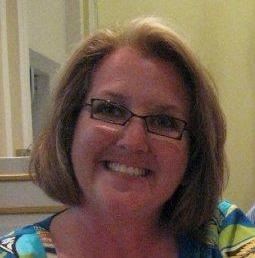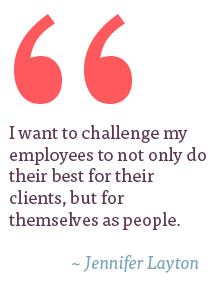We asked Jennifer Layton of LTHC Homeless Services, formerly known as Lafayette Transitional Housing Center, for her take on leadership. The executive director of 25-staff strong LTHC since December 2000, Layton has cobbled together the best of what she's seen modeled to become the leader she is today. Here's her story:
 I have served as an executive director for many years, and my leadership style has continued to evolve. If I took a class on leadership, I’m sure I would learn about many styles that I have bits and pieces of, but the one that I feel most connected with is Servant Leadership.
I have served as an executive director for many years, and my leadership style has continued to evolve. If I took a class on leadership, I’m sure I would learn about many styles that I have bits and pieces of, but the one that I feel most connected with is Servant Leadership.
I have built my career around the philosophy of servant leadership which, in part, means that there is nothing I am unwilling to do to help reach the goal of ending homelessness. Ending homelessness takes a collaboration of people and organizations that all must work together. When I began my career with LTHC, 22 years ago, I honestly thought it would be an easy job… because how many homeless families could there be in Lafayette, Indiana?? There were more than I imagined. My next thought was “who doesn’t want to end homelessness?” There are those people as well. I take it as a personal challenge to help them understand the reasons that people become homeless and what they can do to help. All of those years of working directly with adults and children who had lived experiences that I had never imagined helped shape who I am.

Their stories, their challenges, and their determination showed me that when offered resources and support, people will succeed! I see it as my responsibility to continue to speak for them to make sure others will have a life-changing experience as well.
When I think about the impact I want to make at LTHC, I know I don’t want to be just a manager... I want to be a leader. I want to use my experiences working with homeless people to share their stories and show the community how important of a role LTHC can play in changing lives. I want the staff and the board of LTHC to understand their role and the impact they are making on the lives of people who are experiencing homelessness. Helping people is both rewarding and tiring, so my hope is to create an environment where the staff all feel appreciated and supported. Our role in the community is to end homelessness, and we can only do that by working as a team. Each person on my staff plays a valuable role, and it’s my job to encourage and help each part of my team understand their role and the asset they are to the group.
If I had to pick a single person who has influenced my leadership style the most, it would be my mother, who passed away three years ago. She was the perfect role model – diplomatic in all situations but also clear about what she wanted to achieve. In her philanthropic roles, she was the type of person who led by example. She would challenge people to learn about new things and ways the community could work together to solve issues. She drew people to her with her energy and enthusiasm and used her passion to help educate them and draw them into the solution.
Every leader should possess the quality of flexibility; and in my personal and professional life, there is rarely a day that goes according to plan. I have worked with many people who, when something goes awry, will get flustered and maybe even panic. I like to keep an even-temper so that problems that arise can be evaluated and addressed. While I consider myself passionate, I don’t think I am prone to emotional carelessness.
I encourage everyone on my team to think about their role and what they can do to be more successful. I want to challenge my employees to not only do their best for their clients, but for themselves as people. Doing the kind of work we do is life-changing – not only for the client, but also for the staff.
The one thing that I had to learn about leadership, the hard way… is to realize that not all people have the same values and beliefs that I do. Especially when it comes to basic human needs. I believe that we must do all we can to end homelessness for everyone. I had assumed that every person would have that same (or at least similar) belief. However, I have seen decisions being made that have huge consequences on the people that have the weakest voice. When I see this happening, it makes me even more determined to use my leadership skills to educate and provide insight to others.
Throughout my career, I have worked under several different types of leaders…all of whom I learned from. Some I aspire to be more like – to use some of the skills that I have seen them use successfully. There are also “leaders” that I have met that I try to avoid what I have seen them do because I judge it to be ineffective or not compatible with my own style. Every leader must find his/her own way to be true to themselves.

